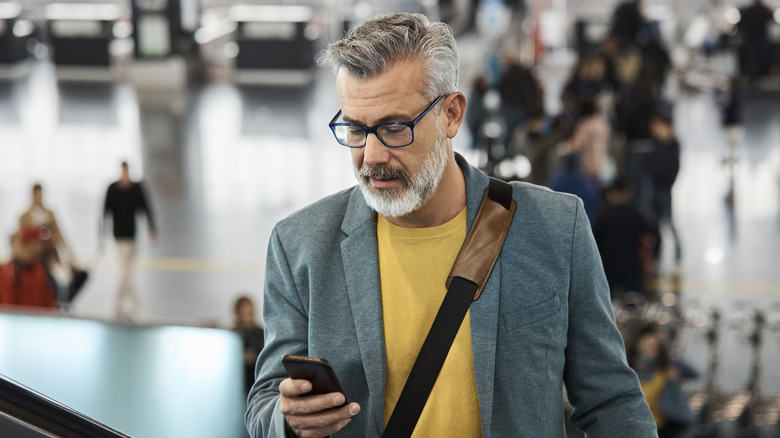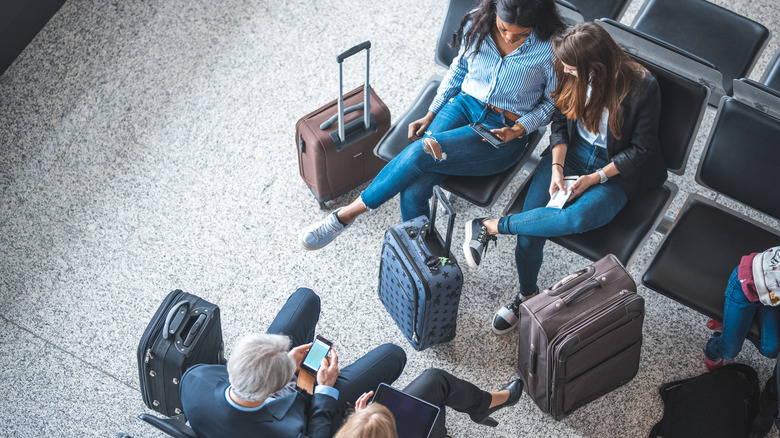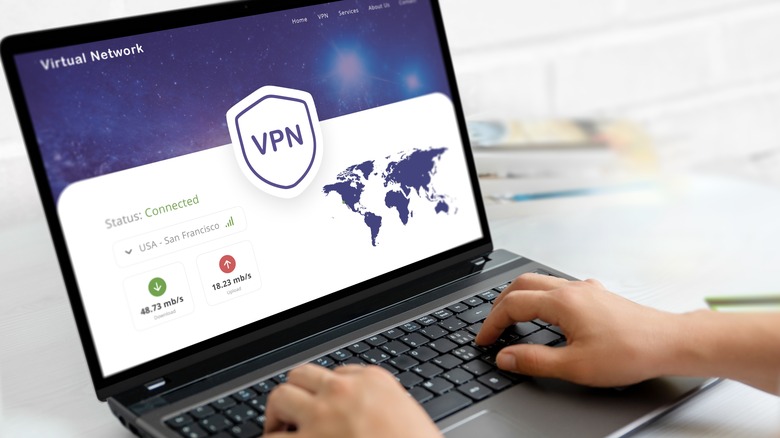The Best Ways To Protect Your Data When Using Airport Wi-Fi
Whether it's quickly answering a work email before logging off for your vacation or video-calling a loved one to let them know that you've landed safely, free Wi-Fi can be one of the most important airport amenities for many travelers. But is it actually safe to use? Unfortunately, if you're worried about keeping your data safe while you're away, it's probably not a good idea to connect to airport Wi-Fi without taking some precautions first.
To understand the dangers of using free airport Wi-Fi from a security perspective, Islands spoke to Theresa Payton, the founder of Fortalice Solutions, which specializes in cybersecurity. Payton informed us that the very same features that make airport networks so easy and convenient to use also make them a major security risk. She explained, "Airports tend to have weak security protocols in place for their Wi-Fi networks to provide more convenient connection for users."
The easiest way to avoid leaving your sensitive data vulnerable is to simply not use the airport Wi-Fi. Obviously, you can download or print out everything you might need at the airport before you leave for your trip, but depending on what you want to use the internet for, that may not be a realistic solution. As an alternative, Payton suggested using your phone as a personal hotspot. Although not foolproof, you have a lot more control over the security settings than when you use a public network.
What are the risks of using airport Wi-Fi?
In general, airport Wi-Fi networks tend to have pretty weak security (and you probably shouldn't trust the free Wi-Fi at your hotel, either), which means that your data can be intercepted. According to cybersecurity expert Theresa Payton, one common way this can happen is through a "man-in-the-middle attack." In a man-in-the-middle attack, someone is able to intercept your data (like your passwords or credit card number) before it reaches the actual website or app that you were trying to use. While it might seem like your transaction went through normally, a third party with bad intentions actually got ahold of your private information.
In many cases, hackers may actually create duplicate Wi-Fi hotspots which look just like the real thing. Airport Wi-Fi typically isn't particularly secure or encrypted, which creates the opportunity for fraud. "This makes for an easy target for hackers to set up faulty Wi-Fi hotspots that mirror legitimate networks to steal your sensitive information and data," Payton explained.
If you notice any suspicious networks, you can report them to the FBI's Internet Crime Complaint Center. If you're concerned that you may have been intercepted by an attack like this, though, Payton's suggestions are simple: change your passwords and keep an eye out for anything suspicious, like fraudulent charges on your bank account or unusual email activity.
Ways to make using airport Wi-Fi safer
If you are going to use airport Wi-Fi despite the risks, try not to do anything you wouldn't do if someone was looking over your shoulder, like opening up your medical records or typing in your social security number. If you know before you leave home that you're going to want to connect to the Wi-Fi while you're waiting for your flight, Theresa Payton gave us some suggestions to keep your data safer. There are plenty of apps that can help you make your travel plans, but the most important one to download before your trip might be a VPN, she shared. Adding a VPN to your device will provide your data with the encryption that airport Wi-Fi networks typically lack, making it significantly trickier for anyone to snag your data.
Payton also suggested using a password manager to automatically input your saved passwords. Not only does that save you from having to actually remember your passwords yourself, but it also means that anyone monitoring what keys you type when you log in to your accounts won't have your password. Payton's final suggestion might be the easiest. She told Islands, "Users should make sure that all devices and applications are updated to best protect against known threats and vulnerabilities, and turn off any sharing options on your devices to prevent tricksters from intercepting your data." With these tips, you have one less thing to stress about on travel day.


